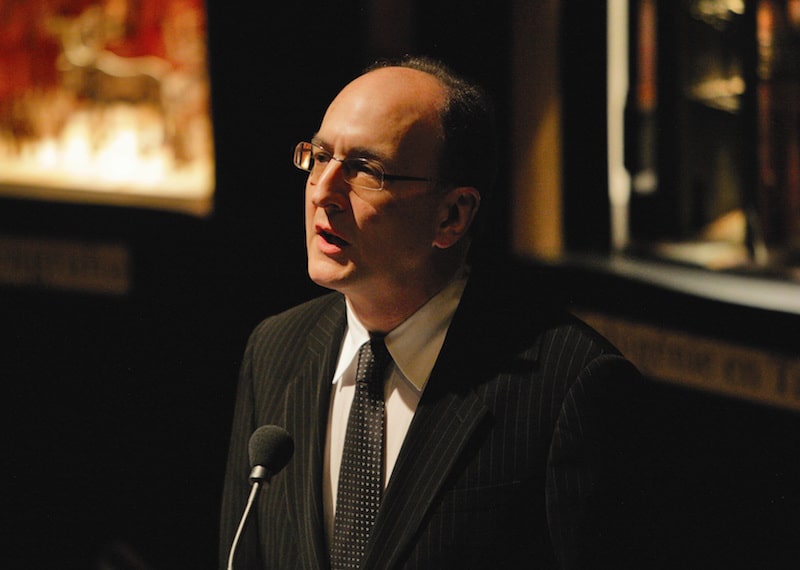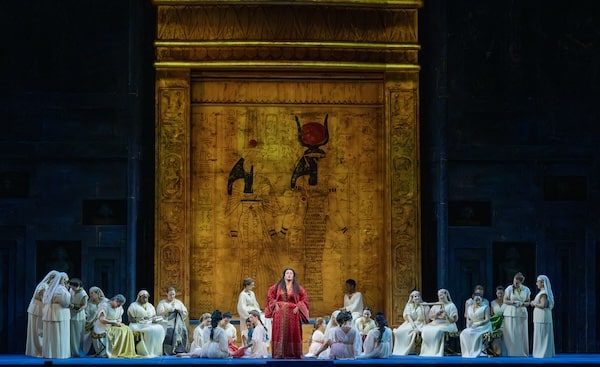The Metropolitan Opera in (bad) numbers
mainPeter Gelb has been putting on a brave face today on his accounts for the Wall Street Journal but the annual numbers you need to know are the ones he’s playing down.
Percentage of seats sold last season: 72
Percentage of box-office potential: 66
Met budget: $300m
Funds raised from donors: $140 million (down from $150m)
Total endowment: $255 million (down from $266m)
Unfunded pension obligations: $88.2 million
Achievement: Avoided deficit (phew, that was close)
Prognosis: Difficult
Full article here.






The Met simply must become more interesting.
I’m there for a handful of performances every season (since the 70s) but now I go there out of habit and wanting to hear specific operas rather than with any enthusiasm. The productions range from silly to embarrassing and both singers and orchestra – no matter how hard they try still gives the impression that they are simply going through the motions. Perhaps its the lack of any real stage direction (at least in the productions I saw last season (Otello, Tosca, Elektra, and Lulu). On the audience side – at least from my perspective – the sense of occasion that one used to feel is long gone.
In order to attract an audience you have to give them something transformative – something that makes them care The polite applause of those remaining audience members doesn’t indicate that. I think many of them are going through the motions as well. The only experience I’ve felt for the past while is of having sat down for a few hours. I think this is the handwriting on the wall.
My opinion is the real talent that will bring down the house is still out there struggling to get discovered. Truly gifted sopranos need very little education from a college or coaches. In fact many colleges, coaches and singing teachers have ruined gifted voices. And remember.. real talent is natural, not earned by advanced degrees or paid for.
And yet opera is struggling to survive because of poor management and bad artistic direction. (see references) The quality of today’s opera productions are so bad that audience attendance is plummeting and this beautiful art is being smeared and degraded into a joke by liberal sex promoting new age interpretations. Voice is no longer what’s important. Sex, violence and disturbing sets are the focus.
So a word of advice to any aspiring operatic soprano: Be careful not to compromise your values or your innocence for a chance to be a star soprano. Its simply not worth it. Take your time and meet quality conservative industry professionals that want to bring back real opera. The classics written by the master composers with traditional staging and costume. Your best off waiting for a quality production that is conservative in nature. Make quality connections and respect them. But watch out for the “players” out there that promise you everything. If the production seems risqué, the staff and management are worse. Couch auditions will be part of their agenda. I think we all know what I mean here.
1) http://www.kinnorclassics.com – real coloraturas are born not made.
2) https://slippedisc.com/2016/08/the-metropolitan-opera-in-bad-numbers/
3) http://www.csmonitor.com/USA/Society/2014/0819/The-Met-averts-shutdown-Does-opera-have-to-be-grand-to-survive-video
4) http://www.nytimes.com/2016/05/07/arts/music/metropolitan-opera-faces-a-slide-in-box-office-revenues.html
5) https://www.theguardian.com/music/2016/oct/27/opera-in-australia-is-out-of-touch-and-untenable-to-survive-it-needs-to-be-reinvented
The Met simply must become far less arrogant. You had to “request” tickets. You couldn’t order them.
I’d like to order for Sunday performances — preferably at 12 noon and 6 pm.
Close the house on Monday and Tuesday, if necessary.
And don’t tell me the orchestra members have to be in church.
The Met simply must become more small.
Amen.
I join in the Amen. Amen!
Why is this incompetent manager still allowed to get away with his litany of excuses, many of them untrue? “Across the board in the U.S. and in Europe…the core opera audience is shrinking,” is blatantly untrue given the figures we have seen from other companies over the last few months.
Gelb was brought in to ginger up the Met – remember that crass comment from the Chairwoman of the Search Committee, “he is hip”? – and he has totally failed to do so. Why does his Board continue to have faith in a man who is overseeing the slow erosion of the Met’s existence? A huge reduction in the endowment over his tenure and a huge unfunded obligation to the Pension Scheme – and he claims the organisation broke even last year? What kind of double-speak is that?
What the Met desperately needs is a total rethink! It needs an Artistic Director who really knows what he is doing, and I suggest it also needs a highly experienced Director of Productions rather as it had when John Dexter fulfilled that role. For Gelb with all his lack of prior experience in pure management to say nothing of artistic direction to have been give the right to experiment at vast cost and then continuously complain that the results are not his fault is not only increasingly tedious, it is frightening.
What nonsense -missing the point entirely
Help me then. Please explain how the endowment is shrinking, the pension fund also and yet the budget is balanced. Just how financially inept are the readers of the Wall Street Journal?
Anyone can juggle numbers around to come out with whatever
suitable answer is desired. You don’t read the Wall st. Journal for intelligent observation especially that which concerns the arts .One needs to understand
how the Met got to where it is $$$$$$$ wise. To put blame onto Gelb who is but a cog
in the wheel is to ignore the true problem . To assume we just need a new director who
will save the situation is stupid short sighted thinking.The answer is staring us in the face but it is better to dance around with getting new directors,new productions etc.
than face certain truths.
Besides, you don’t just kick the son of the former managing editor of the New York Times out….
Yet again, Scott Chamberlain takes apart an article on the Met:
https://maskoftheflowerprince.wordpress.com/2016/08/18/yet-another-feeble-wsj-article-on-the-met-opera/
Yup he sure does ….and misses the core of the problem as usual.
Hi Milka. I would argue that my blog post is not designed to somehow solve the Met’s problems, but is focused specifically on addressing what I feel are bizarre statements from Mr. Gelb, which are wrapped up in a hit-piece of a story in the WSJ. And I stand behind it that regard. I would also agree with you that replacing Mr. Gelb won’t by itself usher in a new golden age for the Met, even though I feel it is at this stage an absolutely necessary step. But I’m curious–here and in comments above, you suggest that the solution to the Met’s problems is staring us in the face, but you don’t seem to articulate it. Would you care to outline it? An honest question… no snark intended.
With Gelb gone nothing changes , dim wits think it is his doing that the Met is where
it is in the scheme of things .What the Met once was is long gone , there is no
bringing back its’ supposed golden age . It all has to do with what one might call “evolution “.
Gelb is a factotum for a Board that is derelict in its fiduciary responsibility. Supposedly there are business people on that board, and people wealthy enough, who hopefully manage their own finances much better.
There needs to be total financial, managerial and artistic restructuring. Start by getting rid of Gelb, a totally Incompetent leader.
I would say that the Met is failing artistically rather than financially, mainly because Levine has been seriously ill for a number of years, and Gleb really wants to be the artistic director despite being ill-suited for this role.
And sales do matter a bit more than Scott Chamberlain suggests. If few people want to see opera at the Met (perhaps because the product isn’t very good), then there seems no good reason for donors to support it. An artistically more vibrant institution not only generates tickets sales but also encourages financial support.
I agree with you 100%. Over the past several year performances and productions at the Met have been lackluster at best – at least the handful of performances I’ve seen every year have been (and that goes for the last few Levine years as well). The Met can’t garner support if the donor class doesn’t care what it produces. Then again, I’m pretty certain that the portion of the moneyed class that cares about opera at all is shrinking anyway. For many of them, opera (and the symphony, for that matter) is just not the prestige institution it was in the 20th century. And, unless it’s a pop star or a sports event, most people couldn’t care less. Society changes.
Try bringing in a few pop concerts like the ROH in London! Let America’s youth see where those who have worked hard – can hang out! And shove in some Opera Proms for them as well! Learn from Europe!
Some of the problem stems from decisions to replace perfectly good productions like The Ring with enormously expensive ones which don’t even work right.
Build a Seven Eleven in the lobby people will come.